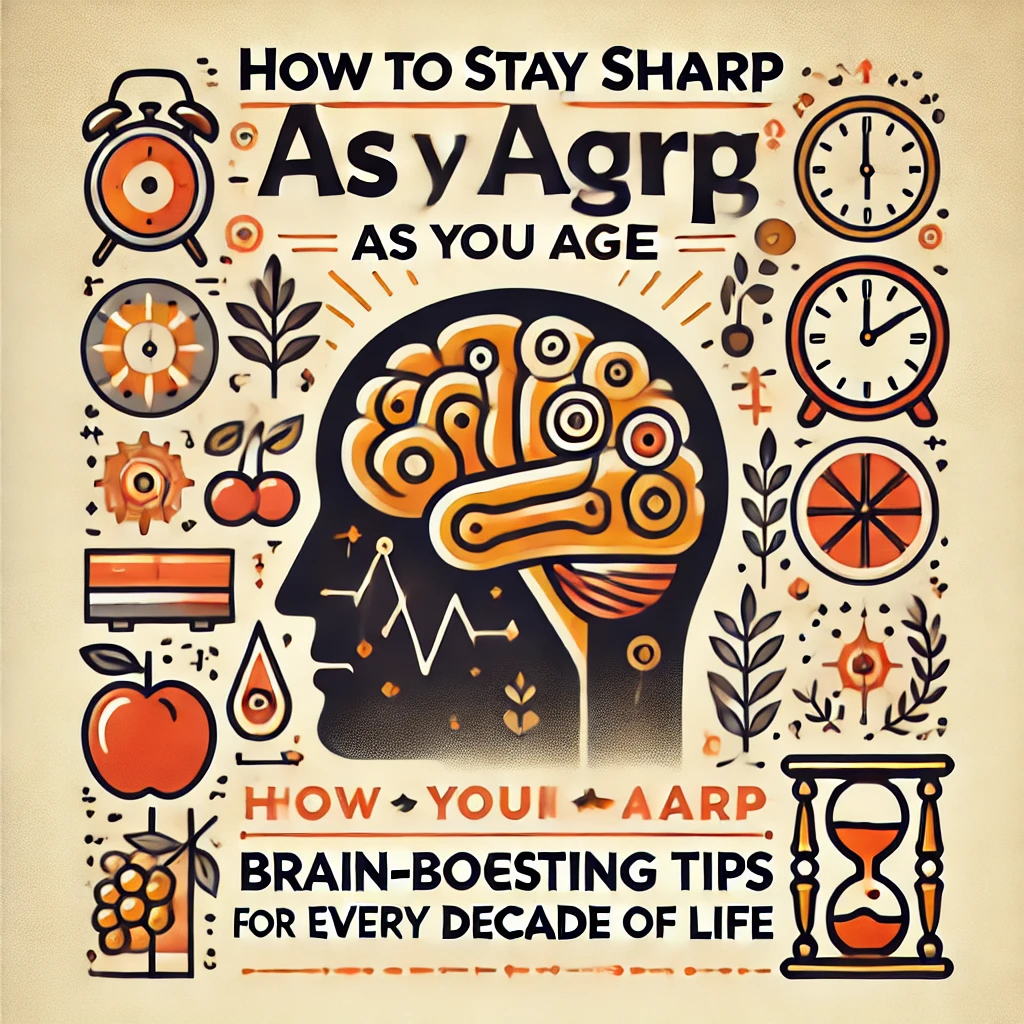Introduction
Aging is a natural part of life, but many people worry about how it will affect their brain health and cognitive abilities. The good news is that you can take steps to stay mentally sharp as you age, and it’s never too late—or too early—to start. From our 20s to our 80s and beyond, each stage of life brings different brain health challenges and opportunities. In this article, we’ll explore brain-boosting tips for every decade, helping you maintain memory, mental clarity, and cognitive function through all stages of life.
Let’s look at practical, age-specific strategies for boosting cognitive health and promoting lifelong brain vitality.
In Your 20s: Lay the Foundation for Lifelong Brain Health
Our 20s are a time of exploration, learning, and laying the foundation for habits that will benefit us throughout life. This decade is the perfect time to start incorporating brain health tips that can prevent age-related cognitive decline in the future.
Brain health tips for your 20s:
- Stay Physically Active: Regular exercise boosts blood flow to the brain, providing essential nutrients and oxygen that support cognitive function. Aim for at least 150 minutes of moderate exercise per week.
- Challenge Your Mind: Engage in activities that stimulate your brain, like learning a new language, playing a musical instrument, or trying complex games like chess.
- Prioritize Sleep: Quality sleep is essential for memory consolidation and mental clarity. Aim for 7–9 hours of restful sleep each night.
Relatable anecdote:
A friend of mine started learning Spanish during her 20s just for fun, but she noticed that her improved focus in her language studies also helped her handle her work tasks with better efficiency and confidence.
Pro tip:
Create a bedtime routine that includes turning off screens at least an hour before bed. This will help you establish healthy sleep habits, which are critical for brain health.
In Your 30s: Strengthen Focus and Manage Stress
The 30s are often a time of increased responsibilities, both in work and personal life, which can sometimes lead to stress. Managing stress effectively and building habits to boost cognitive health can help you stay sharp and resilient.
Brain health strategies for your 30s:
- Practice Stress Management: Chronic stress can impact memory and concentration. Try mindfulness exercises, deep breathing, or meditation to keep stress levels in check.
- Eat a Brain-Boosting Diet: Incorporate foods rich in omega-3s, antioxidants, and vitamins, like salmon, leafy greens, and berries, to support brain function.
- Build Social Connections: Staying socially active can help keep your mind sharp and reduce the risk of cognitive decline. Make time to connect with friends, join groups, or engage in community activities.
Relatable anecdote:
A colleague in her 30s joined a weekly yoga class not only for physical fitness but also for mental clarity. She found that the meditative aspects of yoga helped her manage stress and maintain focus during busy work weeks.
Pro tip:
Try setting aside 10 minutes each day for mindfulness or meditation. Studies show that even a few minutes of mindful practice can help improve cognitive function and mental clarity.
In Your 40s: Strengthen Memory and Prevent Brain Fog
As we move into our 40s, many people start to notice changes in memory and concentration. While these changes are normal, you can combat them with lifestyle adjustments that support brain health.
Brain-boosting tips for your 40s:
- Practice Memory Exercises: Activities like puzzles, Sudoku, and memory games are excellent for keeping your mind active and improving memory retention.
- Focus on Nutrition: Nutritional needs change as we age. Consider foods high in antioxidants, like blueberries, and those rich in vitamin E, like almonds, which have been shown to support cognitive function.
- Stay Mentally Engaged: Take on new challenges at work or explore a new hobby. The more you challenge your mind, the stronger it becomes.
Relatable anecdote:
A friend of mine in her 40s took up jigsaw puzzles as a relaxing evening activity. She noticed that this hobby improved her focus, and it became a fun way to unwind while also stimulating her mind.
Pro tip:
Incorporate at least one brain-challenging activity into your daily routine, whether it’s a puzzle, a crossword, or even a new skill.
In Your 50s: Focus on Lifelong Learning and Heart Health
The 50s are a crucial decade for cognitive health. Studies show that maintaining an active mind through lifelong learning can improve cognitive resilience. Additionally, cardiovascular health plays a significant role in brain health, so paying attention to heart health is key.
Cognitive health in your 50s:
- Learn Something New: Whether it’s an online course, a new hobby, or a book club, keeping your mind engaged can protect against cognitive decline.
- Monitor Blood Pressure and Cholesterol: High blood pressure and high cholesterol can increase the risk of cognitive decline. Regular checkups and a balanced diet can help.
- Stay Active with Regular Exercise: Physical activity improves circulation and keeps both your heart and brain healthy. Activities like walking, swimming, and yoga are great options.
Relatable anecdote:
A friend in her 50s joined a community gardening club. Not only did she learn new gardening skills, but the experience also helped her stay active and socially engaged, which boosted her mood and mental clarity.
Pro tip:
Consider adding strength training to your exercise routine. Research suggests that resistance exercises can improve both physical and cognitive health as we age.
In Your 60s: Emphasize Brain Exercises and Social Interaction
In our 60s, it’s important to keep our minds stimulated through activities that require focus, creativity, and memory. Social connections also play a huge role in keeping the brain engaged and reducing feelings of isolation, which can impact cognitive health.
Brain health tips for your 60s:
- Engage in Regular Brain Exercises: Puzzles, card games, and strategy games like bridge or chess can help sharpen memory and reasoning skills.
- Stay Connected: Social activities like joining a club, volunteering, or visiting with family and friends can help improve mood and maintain cognitive health.
- Get Plenty of Sleep: Quality sleep becomes even more important as we age. Good sleep supports memory retention and mood regulation.
Relatable anecdote:
A family member in his 60s joined a local book club, which gave him a regular opportunity to discuss new ideas with others. He found that discussing books kept his mind active and broadened his perspective.
Pro tip:
Schedule regular social activities, whether it’s a weekly coffee date or a book club meeting. Social engagement is a simple but powerful way to stay sharp as we age.
In Your 70s and Beyond: Prioritize Mental and Physical Wellness
The 70s and beyond are a time to focus on maintaining overall well-being to keep your mind sharp. By focusing on balanced nutrition, physical activity, and mental exercises, you can continue to support cognitive health.
Brain-boosting strategies for your 70s and beyond:
- Adopt a Balanced Diet: Prioritize a diet rich in fruits, vegetables, whole grains, and lean protein to provide essential nutrients for brain health.
- Stay Physically Active: Gentle activities like walking, tai chi, and swimming are excellent for maintaining cardiovascular health, which benefits brain function.
- Practice Mindfulness and Meditation: Regular mindfulness exercises can improve focus, reduce anxiety, and increase resilience.
Example:
A neighbor in his 70s began practicing tai chi in the mornings, finding it helped with both his balance and his mental clarity. He shared that the focus required in tai chi made him feel more centered throughout the day.
Pro tip:
Experiment with different gentle exercises to find what feels best for your body. Even 10-15 minutes of daily movement can have a positive impact on mental clarity and overall well-being.
Bonus Tips for Staying Sharp at Any Age
While each decade brings its own set of challenges and opportunities, these brain health tips are valuable for anyone looking to enhance cognitive function over the years.
- Practice Gratitude: A positive mindset can reduce stress and support mental clarity. Try keeping a gratitude journal to focus on the positives in life.
- Laugh Often: Laughter stimulates the brain, reduces stress, and boosts mood, all of which are beneficial for cognitive health.
- Limit Alcohol and Avoid Smoking: Both alcohol and smoking have been shown to have negative effects on brain health. Reducing or eliminating them can lead to better cognitive function as you age.
Relatable anecdote:
I started keeping a gratitude journal as part of my morning routine, and I noticed that focusing on positive aspects of my life helped me feel more mentally balanced and resilient.
Pro tip:
Set aside a few minutes each morning or evening for gratitude journaling. It’s a small habit with big benefits for mental well-being.
Conclusion
Staying mentally sharp as you age isn’t about one-size-fits-all solutions. It’s about adapting to each stage of life and incorporating habits that support lifelong cognitive health. From physical activity and nutritious food to brain exercises and social engagement, every small step you take can make a big difference in your brain’s resilience.
Whether you’re in your 20s or your 70s, remember that it’s never too early or too late to start prioritizing brain health. By following these brain-boosting tips for each decade, you’re investing in a future that’s mentally clear, sharp, and fulfilling.
FAQ Section
1. How can I stay mentally sharp as I get older?
By practicing lifelong brain health strategies like regular exercise, mental stimulation, and a balanced diet, you can maintain cognitive function as you age.
2. What foods improve brain health in older adults?
Foods rich in omega-3s, antioxidants, and vitamins, such as salmon, berries, and leafy greens, support brain health.
3. Does exercise really help cognitive function?
Yes, physical activity improves blood flow to the brain, which helps maintain mental clarity and memory.
4. How does sleep affect brain health in aging adults?
Sleep is essential for memory consolidation and cognitive resilience. Good sleep supports brain health at every age.
5. What social activities help maintain cognitive function?
Joining clubs, engaging in volunteer work, or spending time with friends and family can help keep the mind active and reduce cognitive decline.
6. Can learning new skills boost brain health?
Yes, lifelong learning stimulates the brain and promotes neuroplasticity, which can improve cognitive function.
7. How can I reduce stress to support brain health?
Mindfulness, deep breathing, and regular physical activity are excellent ways to reduce stress, which benefits both brain health and mental clarity.
8. Are brain games helpful for aging adults?
Yes, games like crosswords, Sudoku, and card games can help improve memory and mental flexibility.
9. Is it possible to prevent memory decline?
While age-related changes are natural, lifestyle factors like a healthy diet, regular exercise, and social engagement can help slow memory decline.



